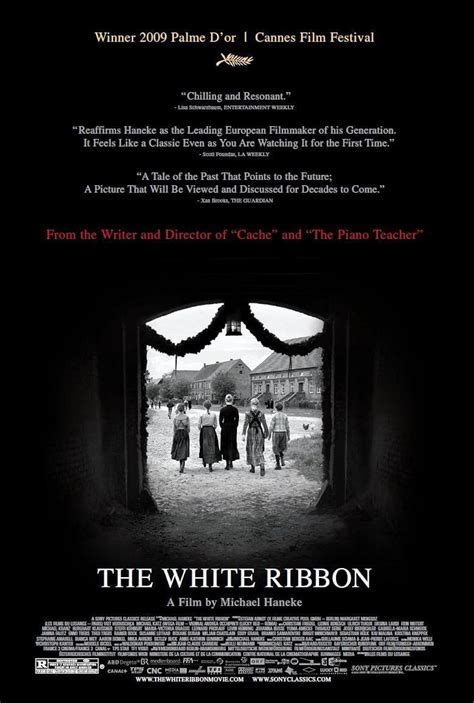The White Ribbon
directed by: Michael Haneke, year: 2009
actors: Christian Friedel, Ernst Jacobi, Leonie Benesch, Ulrich Tukur
actors: Christian Friedel, Ernst Jacobi, Leonie Benesch, Ulrich Tukur

Description:
The White Ribbon is a 2009 black-and-white German-language film directed by Michael Haneke. Set in a small German village on the eve of World War I, it explores themes of authority, repression, and the roots of evil through the mysterious and unsettling events that unfold. The story revolves around children and families who experience a series of strange occurrences, hinting at the dark undercurrents in the seemingly peaceful village. The film is a critical examination of the societal and familial structures that may have contributed to the rise of fascism.Keywords:
Oppression, Innocence, Violence, Authority, MysteryWhat is the meaning of The White Ribbon movie?
"The White Ribbon," directed by Michael Haneke, explores themes of innocence, authoritarianism, and the roots of evil in a rural German village before World War I. The film presents a mysterious series of events and punishments that hint at the oppressive societal structures and the impact of parental control on children. The white ribbon itself symbolizes purity but also the constraints imposed by a rigid moral framework. Ultimately, the film suggests that the seeds of future violence and totalitarianism are planted in the seemingly innocent actions and beliefs of the community.
Is The White Ribbon based on a true story?
"The White Ribbon," directed by Michael Haneke, is not based on a specific true story but is set in a fictional German village before World War I. The film explores themes of innocence, guilt, and the roots of societal violence. While the characters and events are fictional, Haneke's narrative reflects real historical tensions and moral complexities of that era, prompting viewers to consider the origins of authoritarianism and the impact of upbringing on future behavior.
Is The White Ribbon a good movie?
"The White Ribbon," directed by Michael Haneke, is widely regarded as a critically acclaimed film. Set in a rural German village before World War I, it explores themes of innocence, repression, and the roots of authoritarianism through a series of mysterious events affecting the community. The film is characterized by its stark black-and-white cinematography and thought-provoking narrative. It has received numerous awards, including the Palme d'Or at the Cannes Film Festival. While its slow pace and ambiguous storytelling may not appeal to all viewers, it is praised for its depth and artistry.
What happens at the end of white ribbon?
At the end of "The White Ribbon," the narrator, who reflects on events in a rural German village before World War I, reveals that the mysterious incidents of violence and cruelty remain unsolved. The film closes with a haunting atmosphere as the village is left in disarray, hinting at the rise of authoritarianism and the impending war. The final scenes suggest that the seeds of future violence and fascism have been sown in the strict, oppressive environment of the village, leaving the viewer with a sense of unresolved tension and foreboding.
Explore More Categories: